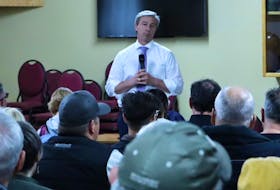EDMONTON — The Alberta legislature will return with a throne speech on Wednesday, and Premier Jason Kenney has vowed to put an end to the carbon tax by the end of the month.
However, that probably won’t be the end of it. The federal government has the power to put in place its own “backstop” carbon pricing on provinces without a tax of their own, as it has done already in Manitoba, Saskatchewan, Ontario and New Brunswick. But it’s unclear, as yet, how long it will take Ottawa to impose that tax on Alberta.
“If a decision is taken to implement the federal system, we will move as quickly as possible in order to minimize a gap in coverage,” said Sabrina Kim, an environment ministry spokesperson.
If the federal government does implement a carbon tax, Kenney promised on the campaign trail to fight it in court, arguing it is unconstitutional, despite the fact that the Saskatchewan government lost its own court challenge on May 3. Ontario’s challenge is ongoing.
Regardless of what happens next, a carbon tax-free period of indeterminate length will begin on May 30, the day the United Conservatives have promised the former NDP government’s $30/tonne levy will end.
Here’s what we know about how things are expected to unfold after Kenney ends the carbon tax.
Will Alberta taxpayers actually save money?
Gasoline prices are likely to drop immediately — a potential political boon for the Alberta Conservatives heading into the summer, when ATVs and boats need gassing up, and vehicles and campers get filled for road trips and vacations.
The Alberta carbon tax accounts for more than six cents per litre of gasoline. So, on May 31, gas should be 6.7 cents cheaper than it was the day before. As of May 16, a litre of gas cost an average $1.16 per litre, which means that even without a carbon tax, prices won’t fall to the lows within Albertans’ recent memory. The drop may be more or less pronounced, though, depending on other factors affecting gas prices at the time.
“All else equal, eliminating the carbon tax will lower energy prices. But, of course, countless other unforeseen developments could occur at the same time to either lower energy prices further or increase them,” Trevor Tombe, a University of Calgary economist, said in an email. “But we shouldn’t confound the policy decision with these external events.”
As for natural gas, prices are expected to drop by roughly $1.50 per gigajoule, reducing home heating costs in Alberta, Tombe said.
Christine Myatt, Kenney’s spokeswoman, said in an email that a single Albertan making $50,000 a year will save $286 over the course of a year. We don’t know how long the grace period will last, but that works out to just shy of 80 cents per day, or about $24 per month.
“Overall, Albertans and Alberta businesses will save nearly $1.4 billion each year, making it easier to hire employees, move goods around the province and heat homes,” said Myatt.
The federal tax is about two-thirds the cost of the current Alberta carbon tax, at least until 2020, when it is scheduled to increase. For example, the federal carbon tax adds about four cents to a litre of gas. So, even if the federal one is brought in, prices should, in theory, not rebound to the full extent.
But why wouldn’t gas stations keep prices high and reap the profits?
Profit margins! Dan McTeague, senior petroleum analyst with GasBuddy, says that any gas station that did that would immediately lose its competitive edge.
“They’ll end up with nobody buying gasoline from them,” he said.
What will happen to the rebates?
When the UCP government eliminates the Alberta carbon tax, they will also be eliminating the rebates. Single people making less than $47,500 currently receive up to $75 per quarter and the New Democrats pegged the overall rebate figure from the climate leadership plan at $453 million.
University of Alberta economist Andrew Leach said that when the carbon tax is gone, “most of the bottom 50 per cent of Albertan households by income will be made worse off by the change, while most of the top 30 per cent by income will be made better off.”
Tombe and Jennifer Winter, another University of Calgary economist, calculated that under the Alberta rebate, roughly 40 per cent of Albertans got rebates that exceeded their carbon tax costs. The federal carbon tax also has a rebate system, and under that plan, up to 80 per cent of Albertans are expected to receive more money back than they are paying out.
What effect might this have on carbon emissions?
The carbon tax works on the principle that — like tobacco taxes — if you have to pay more for something, you’re liable to use less of it. If that seven cents per litre was enough to reduce your gas consumption, the drop in price might mean your consumption will go back up.
“People will have less incentive to reduce emissions,” Leach said. “(So) emissions-saving innovations will have less value.”
• Email: [email protected] | Twitter: tylerrdawson
Copyright Postmedia Network Inc., 2019








